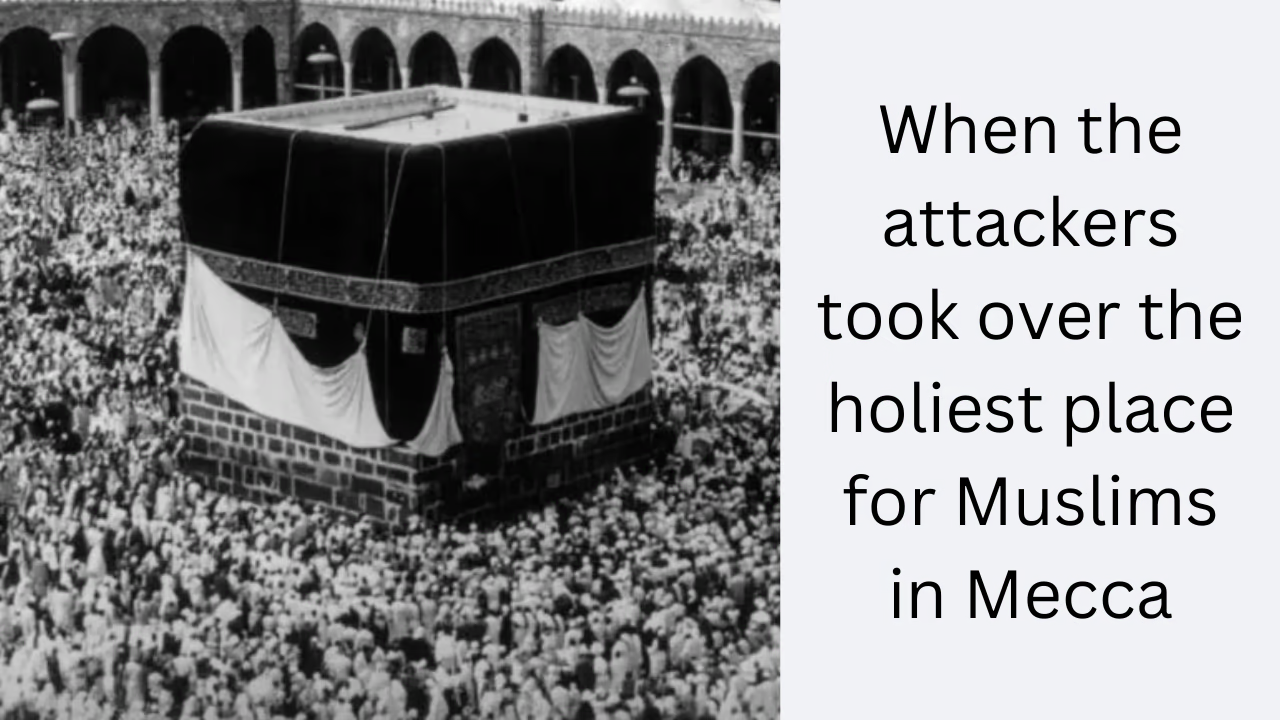On November 20, 1979, the first day of Muharram, Mecca’s largest mosque was crowded with locals and Pakistani, Indonesian, Moroccan, and Yemeni pilgrims.
Among this group of people were rebels who had tied a red checkered cloth on their heads.
Some had been staying inside the mosque for several days and surveying its corridors and paths.
Some had reached Mecca that day by car with their children and wives so that the security forces would not suspect them. Most of them were Saudi nomad Bedouins.
Fajr prayers had begun. The imam’s voice was echoing on the microphone. The time was 5:18 in the morning.
Yaroslav Trofimov has given an interesting description of this incident in his book ‘The Siege of Mecca: The Forgotten Uprising in Islam’s Holiest Shrine’.
He writes, “As soon as the Imam started reciting Kalma after the prayers, the sound of bullets was heard. The speechless people saw a young man with a rifle in his hand moving rapidly toward the Kaaba. Then the sound of another bullet was heard and hundreds of pigeons pecking grains outside the mosque started flying in the air.”
Joheman al Utebi, the leader of the attackers
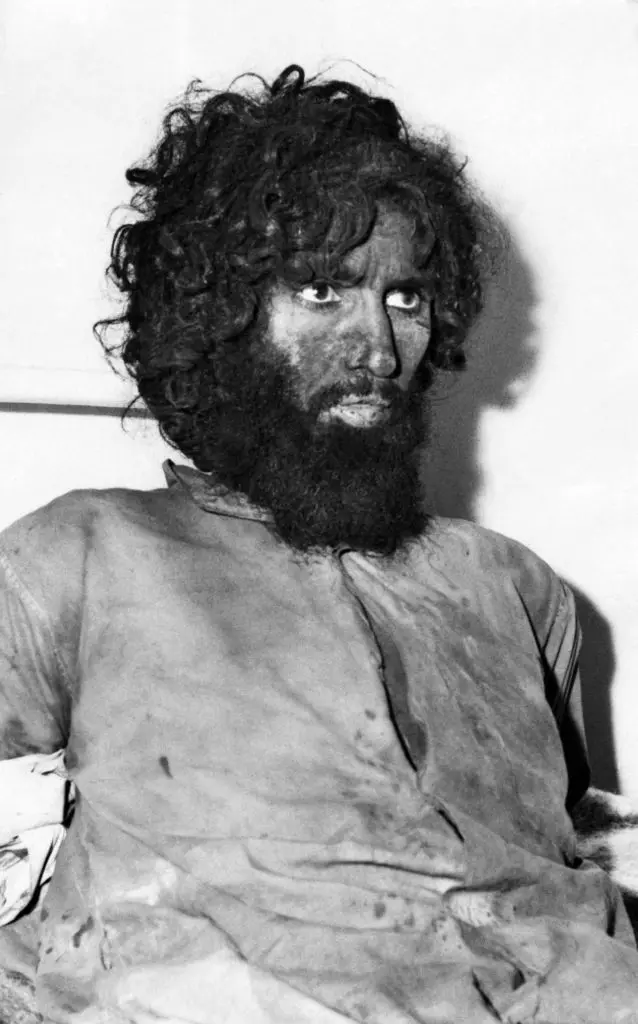
The police force present in the mosque had ordinary sticks in the name of weapons to control the pilgrims coming from abroad. As soon as the two sentries posted at the gates were shot, all the policemen with sticks disappeared from there.
This uproar was still going on when Joheman al Utebi, the leader of the attackers, appeared.
In the book ‘Events at the Shrine Between Truth and Lies’, which is banned in Saudi Arabia, it is written, “43-year-old Bedouin man Joheman had black eyes. He had black hair till his shoulders which were merging with his black beard. Despite being thin, his personality was radiating authority. He was wearing a white traditional Saudi dress which reached till his calves.”
“He was not wearing anything on his head but had a green band on it to prevent his hair from getting unruly. Three attackers were walking with him, carrying rifles, pistols, and daggers. They were all moving rapidly towards the holy Kaaba and the Imam of the mosque.”
All the gates were closed
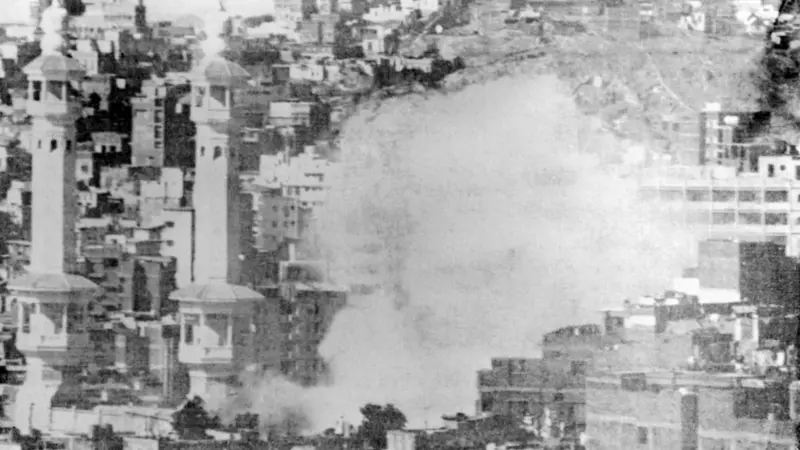
When the Imam saw Joheman, he remembered that he and his companions were present at his speech on Islam a few days ago.
Yaroslav Trofimov writes, “After a few seconds, Joheman pushed the Imam and took over the mike. When the Imam tried to snatch the mike again, one of the attackers screamed at the top of his lungs and put his dagger on his face. Thousands of pilgrims who were watching this spectacle ran towards the outer gates with their shoes in their hands. But when they reached there, they found all the 51 gates closed. In panic, they started shouting ‘Allah Hu Akbar’ loudly. The gunmen also joined in the shouts and the entire complex of the Kaaba echoed with this sound.’
The attackers took position on the minarets
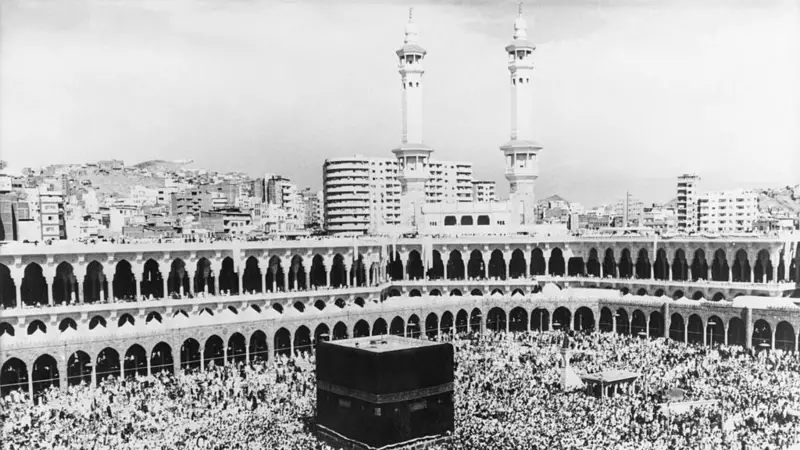
As soon as the sound subsided, Joheman started giving instructions to his companions through the microphone. On hearing his voice, his companions spread out in the entire complex and fitted machine guns on all the seven minarets of the mosque.
The trapped pilgrims were forced to help the attackers. Some people were asked to roll up the carpets laid there and stand them close to the chained gates.
Strong men were asked to climb the minarets at gunpoint to deliver food and weapons. In a very short time, the attackers had gained control of Islam’s holiest site.
Also Read: Gautam Adani charged with fraud and bribery in the US
The minarets are 89 meters (292 feet) high and could overlook the whole of Mecca.
Joheman ordered, “If you see a government soldier raising his hand against you, show him no mercy and do not hesitate to shoot him.”
Many of the hostages did not understand Arabic and were requesting locals to explain the matter to them. Soon the attackers made a group of Indian and Pakistani pilgrims stand in a corner of the mosque and an Urdu-speaking man began translating the announcements into Urdu.
An English-speaking translator was arranged for the African pilgrims.
US Ambassador to Saudi Arabia John C West sent a telegram to the US State Department saying, “The attackers have announced through the mosque’s public address system that they have gained control over Mecca, Medina, and Jeddah.”
Announcement of Doomsday being near
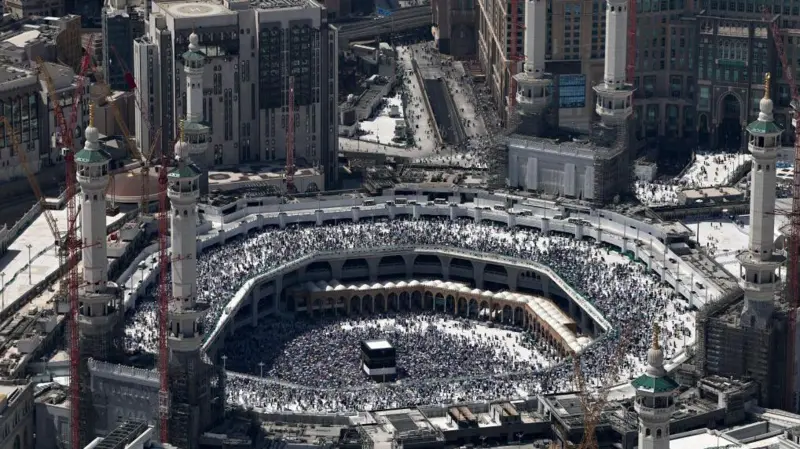
In the next hour, the attackers transmitted an old prophecy through the mosque’s loudspeaker to one billion Muslims around the world, which said that the time of doomsday had arrived and Mahdi had arrived.
When this announcement ended amid gunfire, an atmosphere of fear prevailed throughout central Mecca. Hearing this, people working outside the mosque ran away.
Muslims living in Saudi Arabia and outside it were very sad to hear this announcement.
Later, Saudi Arabia’s Prince Fahd said in an interview with Lebanon’s ‘Al Safir newspaper, “Joheman and his companions had bribed the guards standing outside with 40 thousand riyals so that three Toyota Datsun and GMC pickup trucks filled with weapons and food could enter the mosque. These pickup trucks were parked in the basement of the mosque.”
Arrival of Mahdi
Once the mosque was captured, Joheman ensured that his men controlled every entrance to the mosque.
Then he told the people present that the long-awaited Mahdi had arrived. He said that his name was Mohammed Abdullah al-Qureshi.
It is believed that before Doomsday, Mahdi will descend on earth to eradicate injustice and re-establish the ‘true religion’.
Yaroslav Trofimov wrote, “One by one, all of Joheman’s gunmen kissed Mohammed Abdullah’s hand and swore allegiance to him. After this, they brought crates full of rifles to the center of the complex. They distributed them to their comrades and pilgrims who had decided to support the rebellion.”
Apart from weapons, brochures printed in Kuwait were distributed among the people, which contained articles written by Joheman.
Some pilgrims asked Abdullah if Iran was behind this rebellion.
Abdullah answered in one word, ‘No.’
Fire on police
Around eight o’clock, the Mecca police decided to deal with the crisis for the first time. A police jeep was sent to check the situation.
As soon as the jeep reached the gate, it was showered with bullets. The windshield of the jeep was broken by a bullet fired from the top of the minaret and the driver of the jeep fell from the jeep, injured.
After a while, a large convoy of jeeps was sent to the other gate of the mosque. The attackers also fired at this convoy from the minarets.
In this attack, eight policemen were killed on the spot and 36 others were injured.
The policemen left their vehicles and took cover on the outer walls of the mosque. At the time when the attackers were entering the mosque, Saudi King Khaled was resting in his palace in Riyadh.
Prince Fahd was also not in the country at that time and was sleeping in a hotel in Tunis miles away.
The commander of the National Guard, Prince Abdullah, was also not in Saudi Arabia and was spending his holidays in Morocco.
Saudi Arabia lost contact with the outside world
Khaled was first informed of the attack by Sheikh Nasser Ibn Rashed, in-charge of the Mecca and Medina mosques.
By afternoon, the Canadian company that manages international phone calls in Saudi Arabia was ordered to implement a complete communication blackout.
The result was that neither could anyone call Saudi Arabia nor could telegrams be sent.
The country’s borders were closed for non-Saudi people and Saudi Arabia was virtually cut off from the outside world.
No news of this incident was broadcast on Saudi Arabia’s radio and TV.
Meanwhile, intermittent firing continued between Saudi soldiers and the attackers. Most of the attackers went into the underground part of the mosque./
Abdullah remained on top.
Saudi soldiers were clearing the obstacles coming their way by throwing grenades.
Yaroslav Trofimov writes, “Whenever Abdullah heard the sound of a grenade falling on the marble floor, he would immediately run and pick up the same grenade and throw it back at the soldiers. He attacked the grenade throwers with their grenades many times. But ultimately luck did not favor him. When he was trying to throw a grenade again, it exploded and Abdullah was blown to pieces. No one came to help him at the last moment and he was left to die in the same condition.”
France sent its commandos
At the request of Saudi Arabia, France’s GIGN commandos were sent to help the Saudi soldiers. They had old experience of dealing with terrorists.
In 1976, they freed a school bus full of children from terrorists in Djibouti. First, they gave them food filled with drugs and then started showering bullets on them. All the children were rescued in this operation.
After receiving the Saudi request, French President Valéry Gisca d’Estan ordered GIGN chief Christian Protia to provide all possible help to Saudi Arabia.
Protia handed over the responsibility of this operation to Paul Baril. He planned to use CB chemical instead of tear gas for this. During training, he had used it on himself and narrowly escaped being blinded in the process.
The commandos dressed like civilians
Baril’s team boarded a Mystere-20 aircraft and reached Riyadh via Cyprus.
The Saudis were expecting that France would send a large team for this operation but they were surprised to see that there were only three people in Baril’s team.
Later Paul Baril wrote in his autobiography ‘Very Special Missions’, “To maintain secrecy, I and my companions had to hand over our passports to the French Embassy. I was wearing bell bottoms and cowboy belts like civilians. We did not even have weapons for our protection. We had no means of talking to our officers, except to depend on the Saudi telephone. For the outside world, we were three businessmen but our broad shoulders and muscular bodies were telling a different story.”
Around midnight, the French commando team landed at the Taif military airport. They were put up at the Intercontinental Hotel in Taif.
Demand for one ton of CB chemicals
The next day they started training Saudi commandos for the mission. Baril was hoping that he himself would go to Mecca and lead the operation outside the mosque.
Baril writes in his autobiography, “A Saudi officer told me that if you want to go to Mecca, you will have to accept Islam because people of other religions are not allowed there. I was a Catholic and till then did not know anything about Islam. But I did not delay in answering that if the work has to be completed then there is no problem in changing religion.”
On reaching the hotel, Baril sent his boss a list of things that he needed. This list included flak jackets, grenades, sniper rifles, field radios, night vision goggles, and one ton of CB chemicals.
Portia was surprised to hear the quantity of CB because, with this much CB, the whole city could be brought under control.
Yaroslav Trofimov writes, “Despite the ban, Baril and his two companions not only went to Mecca but also entered the mosque before the attack. However, France later clarified that their role in this operation was only to provide equipment and train Saudi commandos in Taif. According to them, Baril and his colleagues did not step on the holy land of Mecca during the operation.”
Executing Baril’s plan, Pakistani and Turkish workers started drilling holes in the surface of the mosque.
Saudi soldiers wearing face masks and chemical suits provided by France fired CB canisters. Since the radio system there was not working properly, the soldiers were ordered to press the triggers of the CB launchers as soon as the first explosion occurred. The CB started showing its effect immediately and the attacking rebels were surrounded by a cloud of poisonous CB.
As expected, the CB slowed down the activities of the opponents and the Saudi soldiers entered the mosque breaking the barriers and barbed wires.
They started searching the rooms one by one and those who were found alive were handed over to the 40-member arrest team that was following them.
Arrest of Joheman
On December 4, Interior Minister Shahzade Naif issued a statement saying, “By the grace of Allah, the mosque was freed of all the attackers at 1:30 this morning.”
Saudi soldiers planted explosives and broke the doors of the rooms. As soon as night fell, parachute soldiers led by Captain Abu Sultan started the ‘mopping up’ operation.
Later, Captain Abu Sultan said in an interview, “We saw a man with fierce eyes whose hair and beard were tangled. Crates of weapons, dates kept in pots, and some brochures were lying near him. I pointed the gun at him and asked him what is your name? He replied in a low voice, ‘Joheman.’
Captain Sultan said, “Our concern was that our soldiers might kill him. I surrounded him with two officers brought him up and put him in the ambulance parked there. The ambulance took him straight from there to Mecca Hotel.” When asked why he did this, Joheman replied, “It was Allah’s will.” A Saudi soldier grabbed Joheman’s beard and pulled it. Seeing this, a prince present there told the soldier not to do so. 63 people were sentenced to death In this entire attack, 75 rebel attackers were killed and 170 attackers were arrested. On January 9, 1980, 63 of these people were given the death penalty according to Saudi law. Joheman was the first to be beheaded in Mecca. A few minutes later, Abdullah’s brother Saeed was given the death penalty at the same place. Among those who were given the death penalty, there were 39 Saudis, 10 Egyptians, and 6 Yemenis.

